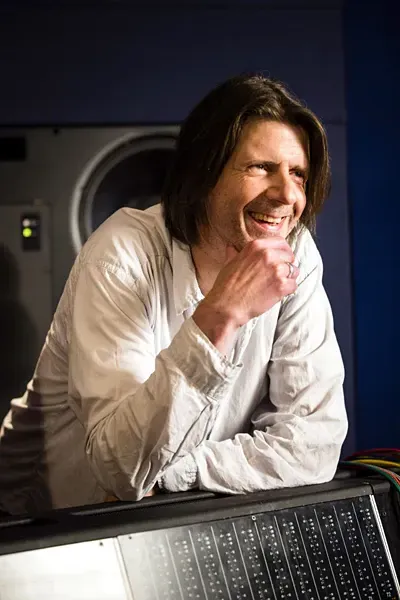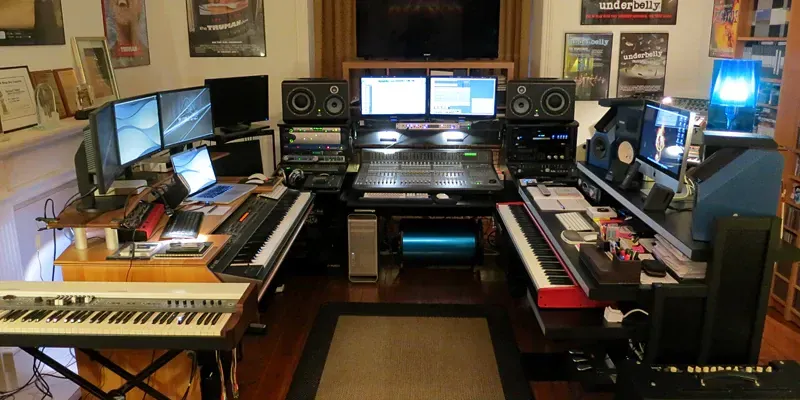Using music as voice
Written by

A master of any profession has earned their stripes through stupendous efforts. In the case of the Underbelly and The Truman Show composer, Burkhard Dallwitz, his efforts have emotionally ricocheted with audiences the world over.
Ande Schurr interviewed Dallwitz before his Masterclass at the Big Screen Symposium this weekend.
* * *
To create is surely the highest joy known to humanity. Not only to create, but to have our creation seen, heard, enjoyed; that is the giving back in the creative process that gives it meaning.
In the case of Burkhard Dallwitz, the German-born Australian composer, trial and error, an open mind, and the 'beneficial intrusion' of domestic life in the creative process all combine to help him create compositions that warrant the title 'world class'.
Catch his Masterclass in Score Composing 'Using Music as Voice' this Sunday 28 September at the Big Screen Symposium in Auckland.
You have achieved the highest accolade that a composer can hope to achieve, Golden Globe for Best Original Score in a Motion Picture for The Truman Show, along with a series of other wins and nominations. How do you consistently perform at this level. What is it about your working style, ability, and personal touch that helps you to find that point of creative unity that the director is looking for in the music?
Fear of failure to be honest. With every project in a sense you start all over again. I guess the most important thing is to approach every new project with an open, creative mind and not too many pre-conceived ideas. Each director has a different way of working and communicating with a composer, so it’s important to listen and understand what the director is after.
Is there any rhyme or reason how you find work. Do directors approach you 100 per cent of the time to consider the job or do you network and ‘hustle’ for business as they say in the freelance market? One would assume that after your achievements you might not have to work so hard to find work!
It varies a lot. Sometimes projects are offered to me. Especially from directors and producers that I have worked with before and have built up a good working relationship. Other times new clients will contact me via email or vice versa. I also will approach directors/producers whose work I admire and that I would like to work with.
Without referring to your past achievements, how would you describe yourself if you were pitching for the composers roll on a movie that you really wanted to be a part of?
First and foremost I would send them a selection of my music. Preferably tailored to the specific project, as that’s ultimately the key to getting the gig. Of course I would also include a list of credits and achievements in order to demonstrate my knowledge and experience.
You developed the television theme music for the 2000 Sydney Olympics and have had your music for the 2002 Salt Lake Olympics performed by the 385-voice Mormon Tabernacle Choir. How does it make you feel to develop music that has such a powerful effect on the world who are watching at the time if not lingering a long time afterwards?
It is always exciting to write for a large orchestra as it’s such a powerful voice, and in the case of the Salt Lake Winter Olympics it was the icing on the cake to be able to utilize and record such an enormous and famous choir. As a composer you always hope that your work resonates with the audience and I think with the Sydney 2000 Olympic theme it managed to do that.
How did you begin to create the music for the theme song? I mean, where did the spark of the idea come from given that there is no movie to help you match the music to!
You are right in that it’s quite different and challenging to come up with a stand alone theme. As you point out, there are usually no visuals to write to. The music comes first so you literally start with a blank page. A TV theme is the audio trademark of a show. A kind of a “call to arms”! It also needs to convey the overall tone of the show.
This was particularly important for a show like Underbelly. With my composition IT’S A JUNGLE OUT THERE I tried to grab the audience from the very first bar with the pounding drum intro. A title theme is usually only about 40-45 seconds in duration so you also need a strong musical ‘hook’ that pulls the audience in and makes it memorable.
Do you get involved in the sound design at all? How exactly do you work with the all-but-finished movie that you must score?
Again it varies a lot from project to project, but I like to at least have a good conversation with the sound team just to get an idea of what approach they have in mind and to give them an idea of what I’m planning to do. Where there is a fine line between sound design and music it becomes even more important to collaborate very closely, and in situations like that I will often send the sound team rough mixes of my cues well before the final mix starts to take shape. In the end though you have to trust the director and the sound mixers to make the right decisions, as composers are often not present at the final mix.
Are you a believer in gadgets and software wizardry to create the right sounds? When I see the studios of composers I feel daunted at the size and complexity of them!
I find that having a large palette of sounds available to me is very important regardless of the instrumentation that I’m writing for. When I mock up orchestral cues, I want to be able to be inspired by the orchestral samples that I’m using and these days the technology and quality has come a long way to achieving this. I’m also very interested in, and have had a life long obsession with electronic music. As a result I spend a lot of time preparing and programming sounds prior to scoring a project. The technology in studios these days is pretty universal. I use Cubase as my sequencing software running a huge library of software instrument plugins and record to Pro Tools as my DAW, which also runs the pictures. Apart from that I have two separate computer systems that hold all my orchestral and ethnic instrument libraries that I have collected over the years.
For me the important thing is that everything is hardwired in my studio, meaning I don’t have to worry about patching things. Everything is available to me so that I can focus on the creative process and not have to worry about technical issues. During the writing process I’m usually alone in my studio, which is essential for me as I like to work intuitively rather than intellectually and that involves a lot of trial and error. Once I have finished writing and track laying all my parts, I will hand over to my audio engineer and final recordings and mixes will be done in other commercial studios.
Having said that, I’ve always had my studio at home because I actually enjoy domestic life intruding the creative process. It keeps me grounded.
Have you helped train or mentor budding composers, including your two children, and have any stood out that you feel particularly proud off and have excelled in their own way off the back of your tutelage?
I have mentored a number of young composers and also participated in a lot of workshops and master classes for budding screen composers. I enjoy the exchange of ideas with young composers as you can often learn from them as well. As far as my kids are concerned, they are both involved in creative endeavours but funnily not music. My son is a visual artist and my daughter is pursuing creative writing.
At the age of 8 you trained in the classical piano. Since that became the foundation of your music repertoire at such a young age, do you still prefer to begin composing with the piano and build from there?
I certainly use the keyboard as my main writing tool and instrument but not necessarily as a piano instrument. I might start with rhythmic parts or a string arrangement or indeed an electronic soundscape. There is no template as such.
But I still love writing for piano whenever it is possible and appropriate.
- The Big Screen Symposium, in Auckland on 27/28 September 2014, is the annual event that puts the filmmakers of Aotearoa New Zealand in one venue for the purpose of debate, discussion, information and inspiration.
